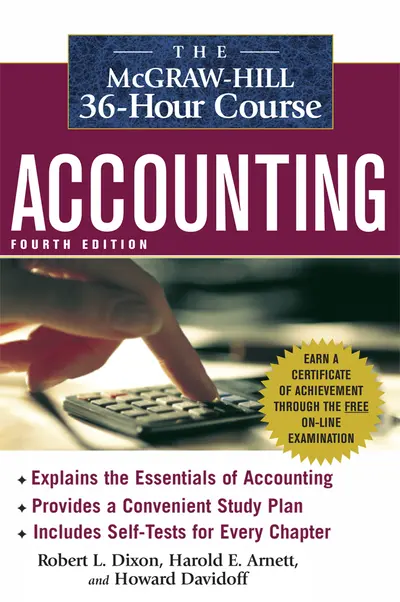My Account Details

ISBN10: 0071486038 | ISBN13: 9780071486033

Step 1 . Download Adobe Digital Editions to your PC or Mac desktop/laptop.
Step 2. Register and authorize your Adobe ID (optional). To access your eBook on multiple devices, first create an Adobe ID at account.adobe.com. Then, open Adobe Digital Editions, go to the Help menu, and select "Authorize Computer" to link your Adobe ID.
Step 3. Open Your eBook. Use Adobe Digital Editions to open the file. If the eBook doesn’t open, contact customer service for assistance.
Quickly get up-to-speed in all basic accounting principles and procedures and apply that knowledge to real-world financial decisions and requests
The McGraw-Hill 36-Hour Accounting Course has been the gold standard for anyone looking for a fast, no-nonsense primer in all the fundamentals of financial, managerial, and tax accounting concepts. Now thoroughly revised and updated, the fourth edition features new coverage of the technological developments in the field, the recent sweeping tax reforms, and the latest Financial Accounting Standards Board pronouncements.
The McGraw-Hill 36-Hour Accounting Course offers such up-to-date coverage as:
- Complete analysis of the current trends in computer hardware and accounting software
- Coverage of current tax issues, such as the revision of tax rate structure, new deductions and credits for higher education costs, and taxation of Social Security benefits
- New test problems throughout to help you gauge your progress, as well as a final exam that can earn you a Certificate of Achievement
Complete with a doable study plan, The McGraw-Hill 36-Hour Accounting Course is your fast track to easily mastering the essentials of accounting in the shortest time possible.
Preface
Introduction
Chapter 1: The Balance Sheet
Chapter 2: The Income Statement
Chapter 3: The Accounting Structure
Chapter 4: The Accounting Cycle
Chapter 5: Working Capital
Chapter 6: Statement of Cash Flows
Chapter 7: Inventories
Chapter 8: Property, Plant and Depreciation
Chapter 9: Corporation Accounts
Chapter 10: Dividends and Reserves
Chapter 11: Long-Term Debt
Chapter 12: Basic Cost Accounting
Chapter 13: Cost Standards
Chapter 14: Internal Management Accounting
Chapter 15: Federal Income Tax Concepts
Chapter 16: Personal Computers and Software
Chapter 17: Consolidated Statements
Chapter 18: Income Tax Allocation
Chapter 19: Business Combinations: Mergers, Acquisitions and Consolidations
Chapter 20: Accounting for Foreign Operations
Need support? We're here to help - Get real-world support and resources every step of the way.
